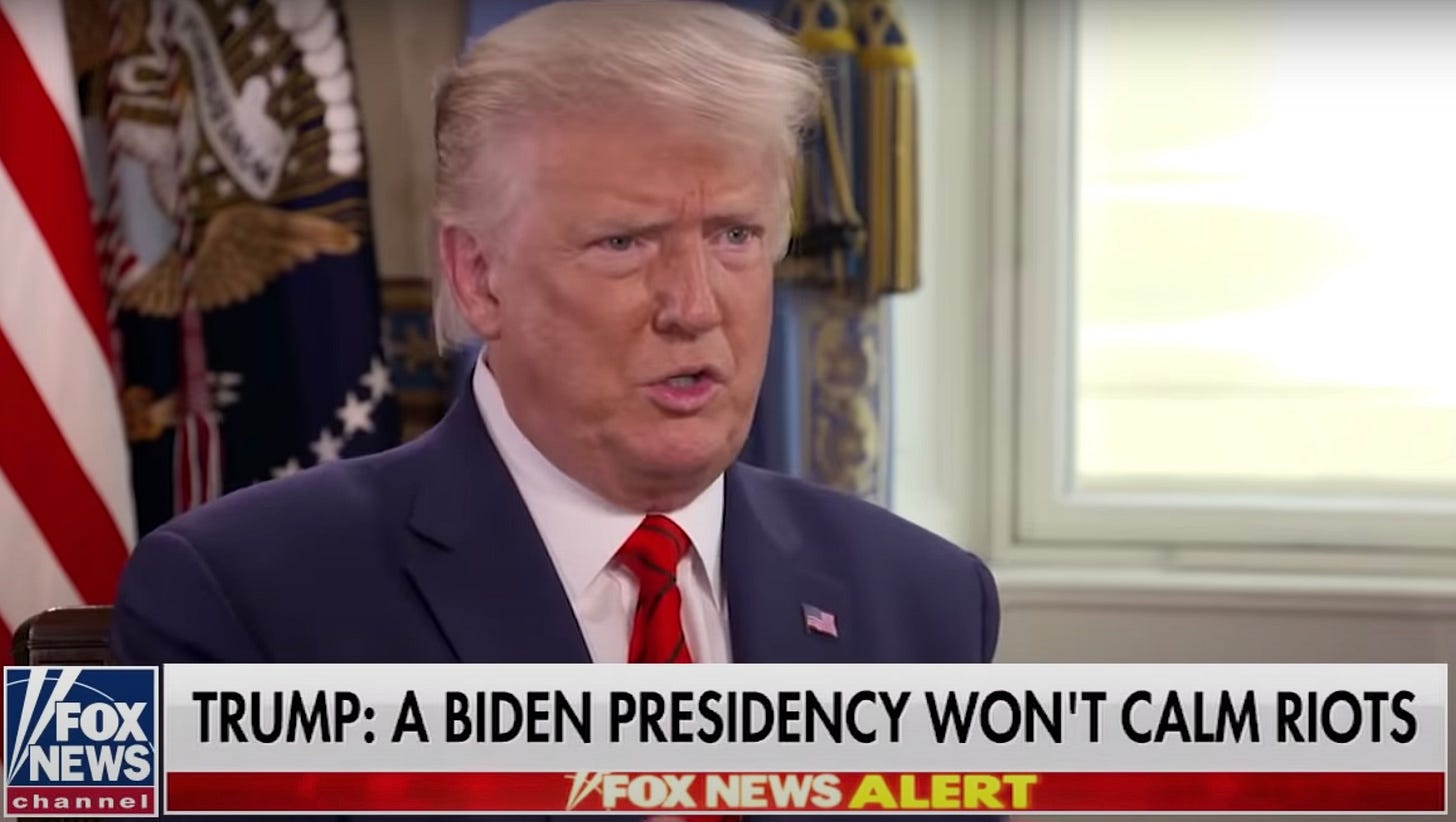Trump's New Conspiracy Theory
"People in dark shadows . . ."
Having encouraged, or at least excused, violence from his supporters during the day, Donald Trump used an interview with Laura Ingraham on Fox News Monday night to encourage, or at least excuse, conspiracy theories.
Here’s the transcript:
Trump: And Biden—well Biden is—I don't even like to mention Biden, because he's not controlling anything. They control him…
Ingraham: Who do you think is pulling Biden's strings? Is it former Obama officials…?
Trump: People that you've never heard of. People that are in the dark shadows. People that…
Ingraham: What does that mean? That sounds like conspiracy theory. Dark shadows, what is that?
Trump: No. People that you haven't heard of. They're people that are on the streets. They're people that are controlling the streets. We had somebody get on a plane from a certain city this weekend, and in the plane it was almost completely loaded with thugs wearing these dark uniforms, black uniforms with gear and this and that. They're on a plane…
Ingraham: Where—where was this?
Trump: I'll tell you sometime, but it's under investigation right now, but they came from a certain city, and this person was coming to the Republican National Convention, and there were like seven people on the plane like this person, and then a lot of people were on the plane to do big damage. They were coming for…
Ingraham: Planning for Washington?
Trump: Yes, this was all—this is all happening. The key moment in this exchange is when Ingraham interrupts Trump and says, “What does that mean? That sounds like a conspiracy theory. Dark shadows, what is that?”
When Laura Ingraham is amazed by something Donald Trump has said, and tries to save him from himself? Donald Trump has jumped the shark.
But of course Trump often jumps the shark. And here we still are.
And perhaps one shouldn’t, after all, be too alarmed by a politician claiming his opponent is being manipulated by men operating in the dark shadows. Politicians exaggerate and even make up things. It’s life in a democracy.
But this wasn’t just any politician. It was the president.
And this isn’t just any president. It’s one who’s not been afraid to encourage, or at least excuse, violence by his supporters.
And it’s one who has shown himself willing to weaponize the executive branch of the federal government against his opponents.
And it’s one who feels utterly unconstrained by norms and even laws when he can find a way around them. Or can get away with ignoring them.
And it’s a president who has found many, many willing accomplices, enablers and rationalizers willing to work with him in the executive branch, protect him in Congress, support him from outside with money and influence, and—like Ingraham—defend him in the media.
Still, a healthy democracy should be able to deal with this.
But how healthy are we? The country is bitterly divided, a division whose bitterness has been much exacerbated by this president. Can we as a nation withstand fear-mongering and conspiracy-theorizing as well as we once might have?
Also, we have an election in two months—one this president has already suggested will be “rigged” in the normal course of events, unless presumably he and his lieutenants take extraordinary actions.
Are we confident that under this administration we will have fair and free elections and a peaceful and lawful transfer of power?
Today is September 1. It’s a date with some historical resonance. One’s first instinct is to think of THE September 1, in 1939, and tend to be reassured: That was an existential and civilizational crisis. This is just Donald Trump.
True.
And yet.
We’re very unlikely to experience a September 1, 1939. But one does not need a world war to do great damage to a liberal democracy, especially to one whose institutions and mores have already been weakened.
Still, one might imagine the suicide of a great country would be aided and abetted by a more impressive figure than Donald Trump. But small figures can do great damage, and death can come by a thousand cuts rather than in one dramatic swoop.
There are nine weeks until the election. Those will be nine weeks of incitement, conspiracy-mongering, and law-breaking by the president of the United States.
That will be a test. If we can overcome that, it will in itself be a promising sign for the future, a sign of civic strength and health.
We need, despite Trump, to have a free and fair election. We need to, as much as possible, and despite Trump, keep the peace. We need to defeat Trump.
Then will come the more fundamental challenge, one less dramatic than those of the 19th and 20th centuries, but not easy: Can we rebuild in the 21st century the temple of liberty handed down to us by our forebears on solid foundations?



